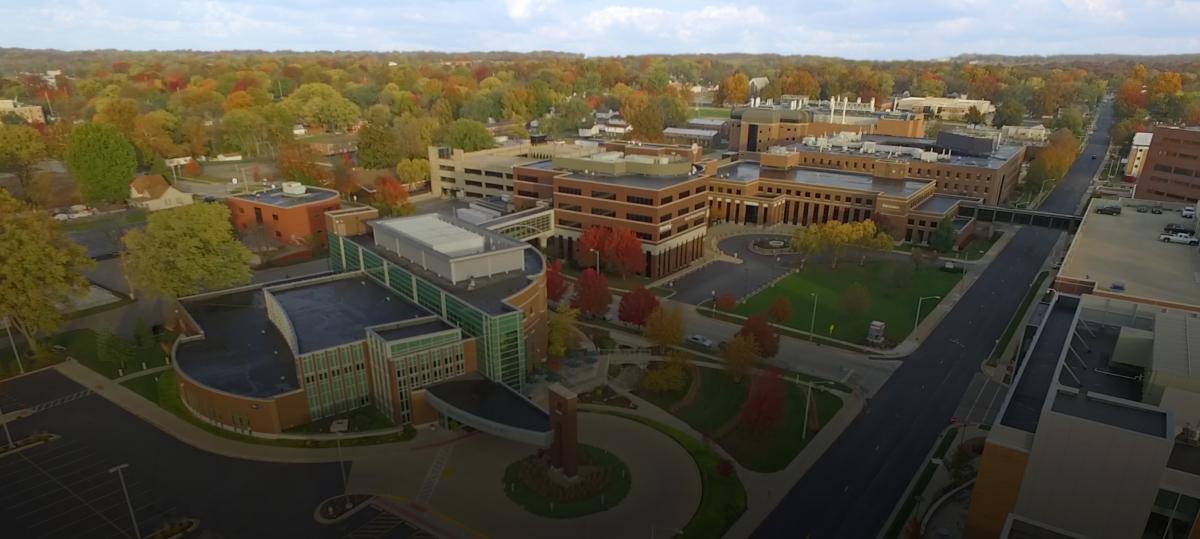A model for medical education
 If SIU School of Medicine is known for one thing, it is innovation in medical education.
If SIU School of Medicine is known for one thing, it is innovation in medical education.
At the time SIU School of Medicine was created, medical instruction was fundamentally lecture-based. Led by the Dean, Dr. Richard Moy, the SIU faculty chose a different tack, one that emphasized solving real-world health problems rather than memorizing facts. The model that evolved provided medical students with early exposure to patient care, and it demanded they master a subject before progressing to the next level of training.
The school’s medical education curriculum received provisional accreditation from the Liaison Committee on Medical Education (LCME) in 1972, allowing the members of the charter class to begin their studies in Carbondale in June 1973. Full accreditation came in 1975, followed that same year by the first commencement of 24 advanced-standing students and in 1976 by the graduation of 43 students in the charter class. In 1980, the IBHE approved converting the School’s three-year curriculum to a four-year program. In 1984-85, students transitioned to a four-year program, as it remains today.
In May 1972, the family medicine residency program in Springfield received preliminary accreditation. SIU’s first graduate medical education training program began in July.
Also in 1972, the school established the Medical Dental Education Preparatory Program (MEDPREP). The pre-med program was the first of its kind in the nation, offering a two-year post-baccalaureate course of studies in Carbondale for students from underrepresented populations to become more competitive candidates for medical and dental school.
SIU School of Medicine quickly became a leader in medical education, recognized for its innovative teaching and testing methods. An early milestone was the publication of Curricular Objectives 1976, the first time a medical school had published a complete set of goals and objectives for the medical degree. In 1984, SIU and the Josiah Macy, Jr. Foundation jointly sponsored an invitational conference for medical educators, “How to Begin Reforming the Medical Curriculum.” This led to more U.S. medical schools studying and emulating SIU’s programs as they began updating their own curriculums.

Howard Barrows, MD, former associate dean for education and curriculum, spent nearly 20 years at SIU developing what would become world-renowned teaching concepts. One was the use of Standardized Patients (SPs), actors from the community who were trained to behave like real patients. This allowed medical students to practice their clinical and exam skills in controlled, supervised setting. The vast majority of medical schools around the globe now use standardized patients.
In 1985, SIU became the first U.S. medical school to require its students to pass a comprehensive performance-based assessment procedure using standardized patients as a condition of graduation. The “clinical competency exam” would go on to become a model for medical licensure examinations for all physicians. In 1987, U.S. News and World Report listed SIU as the medical school most frequently cited for innovative programming.
In 1988, the school added a unique, six-year dual-degree MD-JD program to accommodate the increasing number of individuals seeking interdisciplinary education in law and medicine.
After an extended period of study and evaluation, the School of Medicine implemented a newly re-organized curriculum in 2000, emphasizing principles of problem-based learning. These included self-directed, small-group learning activities centered on actual patient problems, and integration of basic sciences and clinical sciences managed by interdisciplinary teams of faculty.
In 2012, SIU Carbondale’s Physician Assistant (PA) program transferred from the SIUC School of Allied Health, College of Applied Sciences and Arts, to SIU School of Medicine. The PA program was made a division within the Department of Family and Community Medicine.
Also in 2012, SIU School of Medicine and the SIUC College of Education and Human Services began offering a MD/MPH joint program. Students in this five-year program receive both a doctor of medicine degree and a master’s degree in public health.
In 2016, a new third-year curriculum was launched to better develop students’ clinical skills, and The Memorial Center for Learning and Innovation (MCLI) opened. The 72,000-square-foot building includes collaborative and instructional spaces, a medical simulation center for Continuing Professional Development coursework, and the Roland Folse Surgical Skills Laboratory, a state-of-the-art training facility for SIU residents and physicians.
Further confirmation that our educators are doing things well came from the Liaison Committee on Medical Education. SIU School of Medicine received consecutive accreditations in 2007 and 2015, with no citations, from the nation’s major accrediting body. SIU is the only U.S. medical school to ever be scored flawlessly twice.
Compassionate Care
In the last 50 years, SIU School of Medicine’s physician practice has grown from a small medical school providing patient care with the help of community clinicians to a robust institution, partnering with hospitals, clinics and associations across Illinois. Today, SIU School of Medicine is a key player in the continued advancement of medical care in Springfield, Decatur, Quincy, Carbondale and dozens of towns in between.
SIU Medicine, the health-care arm of SIU School of Medicine, is the largest multi-specialty physician group in the region, with nearly 300 full-time physicians and other medical professionals who provide patient care to more than 125,000 individuals each year.
Some have interpreted the school’s mission as filling the region with primary care physicians. Certainly, the numbers represent that: about half of the school’s 3,000+ graduates chose primary care. According to the Association for American Medical Colleges, SIU School of Medicine has the highest percentage of graduates in the nation practicing in rural areas, serving citizens who have few medical resources.
SIU Medicine now includes one of the largest university-owned and administered Federally Qualified Health Center (FQHC) system in the U.S., which serves the region with 13 clinics in eight cities. The programs offer a gamut of services: comprehensive primary medical, dental and mental health care, a network of medically assisted treatment options for opioid use disorder, neighborhood assessments with community health workers and hot-spotting for comprehensive care of the most vulnerable and underserved populations.
Nine institutes and centers deliver advanced patient care. These include Simmons Cancer Institute, the Dale and Deborah Smith Center for Alzheimer's Research and Treatment, the Center for Family Medicine, the Southern Illinois Trauma Center, the Neuroscience Institute and the world-renowned Fertility and IVF Center.
